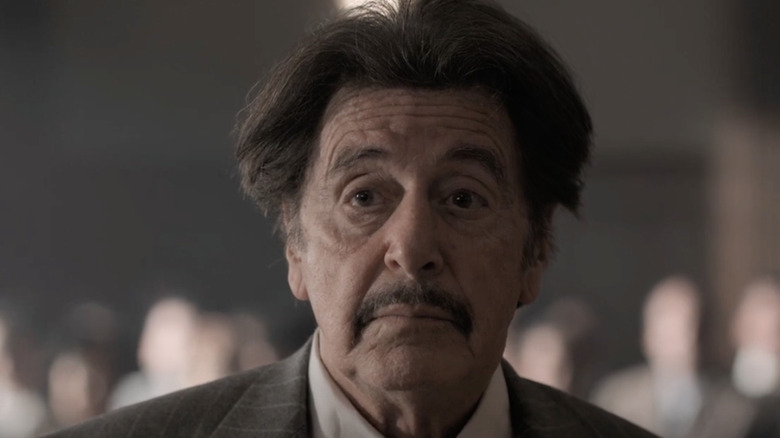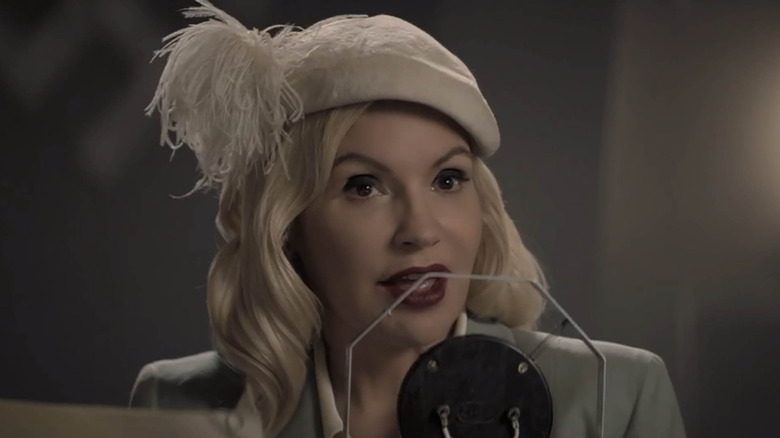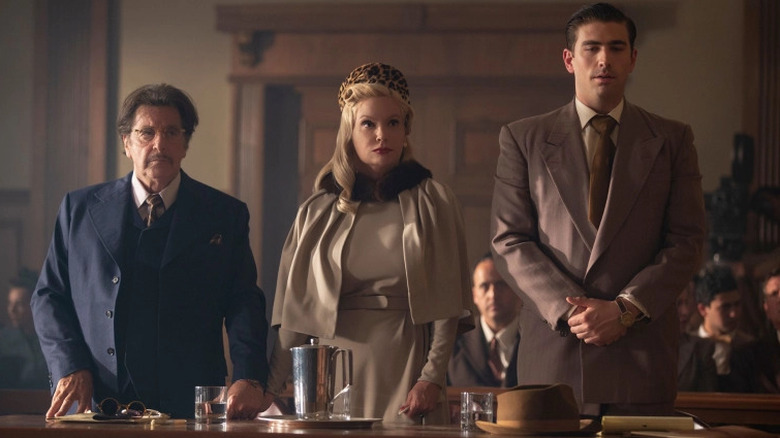American Traitor: The Trial Of Axis Sally Review: 11 Minutes With A Legend
In the grand pantheon of Al Pacino films, "American Traitor: The Trial of Axis Sally" doesn't even crack the top half. But if you find this strange tale from American history compelling, or you are simply a Pacino fan looking for a fix, it's well worth your time.
Directed and co-written by the underrated Michael Polish ("The Astronaut Farmer"), this film brings his signature style, maximum-low-budget aesthetic, and bleak inclinations to a story that should carry relevance for a modern audience. Nearly 80 years ago, Axis Sally was the original "fake news," a broadcaster hiding behind "entertainment" as a defense for misleading, angering, and demoralizing those within the sound of her voice. She is now long gone (Mildred Gillars, her real name, died in 1988), but her pioneering methods of propaganda and media manipulation still pose a threat to America, every day.
None of this is mentioned in "American Traitor"; in fact, it's a bit surprising that the film's late-'40s setting is self-contained, with no attempt to build any parallels or make a commentary on our digital age. Instead, the film is a relatively straightforward re-telling of Gillars' trial for treason focused on three characters: Axis Sally, grizzled attorney James Laughlin (Pacino), and overeager assistant Billy Owen (played by Swen Temmel from "The Bay").
The film begins with Mildred (played by Meadow Williams, "Boss Level") captured in Berlin as WWII comes to an end. Flown home and put on trial, she finds herself represented by Laughlin, a well-known if past-his-prime attorney with a hunger for publicity and little tolerance for fools.
On the eve of the trial, he is approached by Billy, a veteran with a bad limp and no firm plan for his return to civilian life. He offers to help Laughlin any way he can, and the old lawyer makes him a deal: Get a suit and some new shoes and be to the courtroom in an hour, and you have a job. In no time, the wide-eyed kid finds himself sitting at a defense table alongside the most hated person in America — well, now that Hitler's dead.
"Can you sit next to a woman for the final two months of her life," Laughlin asks the kid, "knowing that you'll probably be the last person she sees before she's hanged?"
Desperate for some direction in life, he accepts the assignment. But Billy soon discovers that Laughlin has little intention of defending Mildred — always dressed to the nines, always with bright red lipstick contrasting her flaxen hair.
"I cannot stand that damn Gillars broad," Laughlin whispers to him in court one day. "Did you see the way she walked in today? Like she was Bette Davis or something? I don't want anything to do with her for the rest of the trial."
You're listening to WNZI
"American Traitor" then serves the dual purpose of depicting the trial, but also doling out details about what went on behind the scenes. Naturally, it's hard for any audience to feel sympathy for Williams' Gellar at the beginning, and her icy, detached presence doesn't help matters. But as the film goes along, more details are presented. An American, she moved to Germany to study music, fell in love, and soon found herself "acting" to survive.
With her passport gone, she was forced to work under the propaganda directives of Joseph Goebbels. She amassed 12 million regular listeners, many US soldiers and their families listening from home — but if she tried to quit, she would be killed. When she changed a line, Goebbels raped her. Another time, she attempted to seduce and assassinate the infamous Nazi Reich Minister of Propaganda, only to fail.
But as Laughlin is quick to point out, everyone who can corroborate these details died in the war. Mildred's claims that she was forced to become the voice of Nazi Germany seem to fall on deaf ears who can only remember her broadcasts.
"Are you thinking about what your girlfriends and wives are doing tonight, fellas?" Axis Sally says in one such broadcast. "You don't really blame them for wanting some fun, do you? The last thing in the world they want is for you boys to get all mutilated and broken up from fighting with the unbeatable German Army ... I don't want to see your lives wasted for that mental, moral and physical cripple of a president of yours." Then, smiling, she sings "Yes we have no bananas," the second verse of which has been changed to "Yes, we're all out of mercy."
The film seems fairly faithful to the Axis Sally story, her defense and pleas of it all being a joke shared with the GIs. The plot gets more complicated as Billy makes daily visits to Mildred in her cell, intrigued by her. Laughlin's indifference comes between the two men, and we learn that Laughlin himself lost a son in the war effort.
All rise for Pacino
The person with the most screentime in this film, far and away, is Meadow Williams. She gives a strange, off-putting performance that at first is a bit jarring. Some of her line readings feel stiff, her body movements robotic. But as the film goes on, you realize this is a choice, and it goes a long way toward painting the portrait of a complicated, self-described "survivor" who shut herself off from a world determined to break her. The role also requires Williams to sing, to be sultry, to speak persuasively into the microphone and convince us she might be the type of person who would go see wounded troops in a hospital, record messages home to their American families, then edit those messages to sound as if they were praising their treatment at the hands of Nazi captors. By the end of the film, she has cast an admirable spell.
Unfortunately, the same can't be said for Temmel — who either had the misfortune of receiving a severely underwritten character, or was told to act as if he were made out of cardboard. The Billy character spends the first half of the movie watching other people deliver monologues about how stupid he is, and the last half being told to be quiet while Mildred and Laughlin make big, emotional revelations. At least he gets one good scene where Pacino berates him. One explanation for all this might be because the real Billy Owen lived until 2018, wrote the book on which the screenplay is based, and a video clip in the credits has him telling his story verbatim — all signs that the script saw him as an observer rather than someone who needed to be fleshed out.
That said, the smartest thing "American Traitor" does is give Al Pacino an uninterrupted, 11-minute-long scene where he presents the closing argument. At 81 years old, the man remains a national treasure, and his grand finale in the film plays like a Pacino's Greatest Hits album.
"Miss Gillars is on trial for eight counts of treason," he argues, "for reading from a script she did not write, saying words she did not believe in, and being ordered to say these words on penalty of death."
He gives Laughlin a minimal once-over for character traits — the guy has wild, unkempt hair and a disheveled wardrobe to match. The scene also comes at a time when Mildred seems to have finally endeared herself to Laughlin enough that when he asserts her innocence, he might actually mean it. Pacino paces the courtroom, glasses and legal pad in hand, getting quiet and contemplative, then punctuating lines of anger that you'd never expect, and even breaking down a bit as he invokes the memory of his character's deceased son. He never gives us a "Who-aah!," but the scene still deserves to go down with the great Pacino monologues, and feels like some sort of yang to his "...And Justice for All" yin.
"American Traitor" deserves some sort of award, if only for actor who looks least like the person being portrayed. Over the end credits, they show a picture of the real James Laughlin; he could not look any less like Al Pacino — and his tie is straight. Nevertheless, it feels like the sort of film that would be a perfect A/V day for a history class. A savvy teacher could show the movie, then use the story of Axis Sally to begin a conversation around propaganda, misleading the public, and the culpability of those reading lines written by the hidden, power-hungry men behind them. Whether we're talking radio plays and propaganda films, or social media and cable TV, America has battled the same enemy for quite some time.


